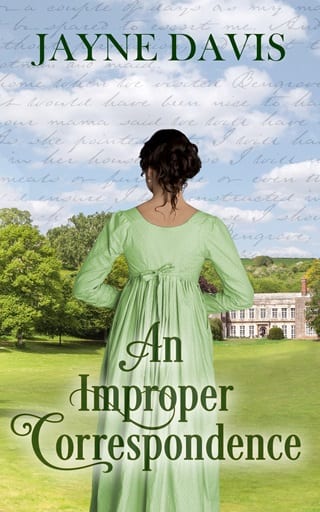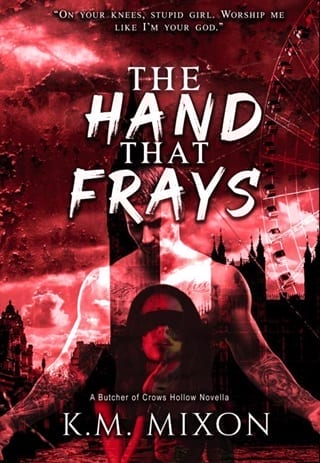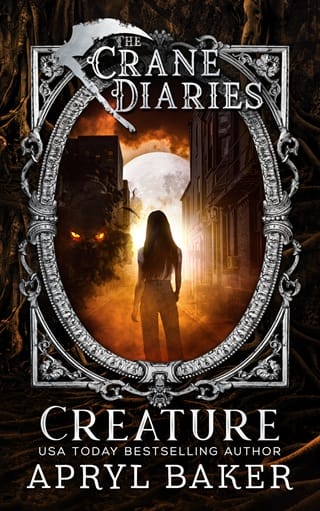Chapter 6
CHAPTER 6
L ondon, February 1813
Lord Yelden's box at the Covent Garden theatre felt quite crowded by the time Jo and her parents seated themselves. Mama had felt well enough to venture out, partly due to the report of their visit to Bengrove Hall that Jo had given her—emphasising the positive points and omitting her true opinion of her potential parents-in-law. Jo had worried about the freezing February winds that had blown through the tiny gaps around the coach windows, but Mama seemed cheerful enough as she sat with Papa at the back of the box.
Aunt Sarah evicted her son from his seat at the front of the box. "Come and sit here, Jo," she said, indicating the chair George had just vacated. "There's a better view, and it will stop George ogling that trollop." She inclined her head towards one of the boxes opposite, where a young woman with a very low-cut gown was gazing down into the crowd in the pit.
Cousin Lydia, sitting on the far side of her mama, gave an embarrassed giggle. The Yeldens had arrived in Town early for Lydia's first season, and this was one of her first appearances in public.
"I'm so pleased you came, Jo," Aunt Sarah said. "I did wonder if Frances would be well enough. How is your young man? Have you heard from him again?"
"I had another letter. He is settled in Verdun now." The letter had been written by the same friend and, to her disappointment, had said little more than the first.
"Oh, that's good. George wanted to know how he came to be captured."
"He didn't give me much detail about that."
"Tell me, what is Bengrove Hall like?"
Jo filled the time until the play started by describing the house and its grounds, then the actor playing Duke Orsino began to proclaim about music being the food of love, and Jo gave her attention to the play.
During the first interval Papa and Lord Yelden left—in search of refreshment, they claimed, but Jo suspected it was to have a cigar. Aunt Sarah spent most of the interval looking at the boxes opposite and pointing out various people to Lydia. The poor girl looked bewildered, and Jo sympathised—the people being indicated were too far away for Lydia to see them clearly, and she would never remember all the names and titles.
Jo was once again grateful for her father's lack of aristocratic status. There were hierarchies amongst the bankers and businessmen with whom the Strettons normally associated, but they didn't seem as complex as the various connections that Aunt Sarah was trying to get Lydia to remember. The only people Jo recognised were Catherine Bengrove and her husband, who waved and smiled at them from a box opposite.
"I wonder if they will come here in the next interval," Mama said, looking hopeful. "I can introduce them to Sarah. Or you and Papa could go to their box to pay our respects."
Jo saw the Bengroves leave their box when the next interval came, but they did not call. "I expect they have other people to see," she said, when the play restarted and Catherine and her husband reappeared in their own box .
"They must have a wide acquaintance," Mama commented, trying to hide her disappointment.
"Indeed they must." But Jo wondered if the Bengroves' wave had been nothing more than an acknowledgement, and wasn't sure that they would wish to be seen with the Strettons in public. Catherine had always been alone, or with her husband, when Jo had called, and she was beginning to think that it might not be a coincidence that no other callers had been present. If Catherine didn't want to introduce her friends to Jo, she might not be as much of an ally as Jo had hoped if she became a sister-in-law. Nor did it bode well for Mama's ambition that Jo become an accepted member of an aristocratic family.
Verdun, March 1813
The lodging house that Campbell found for Rob and Bengrove a few weeks after their arrival was cramped, but clean. Rob had managed a quiet word with Campbell, and as a result was shown a tiny room he could have to himself for the same cost as a shared room. There was hardly space to turn around next to the bed, but it was quiet, and with the chimney from the kitchen running up one wall, was reasonably warm in spite of the frigid weather outside. He suspected it would be too hot when summer came, but he'd deal with that when he had to.
After showing them the rooms, Madame Daniau invited them into her front parlour. She was thin, and dressed in well-worn blacks that looked as if they were her permanent attire. Her hair was firmly tucked into a cap, but there was some grey in the few strands that escaped, and lines around her face and mouth showed that she was not young—approaching fifty, he guessed. She was a gentlewoman of some kind—the way the house was furnished and the books in a glass-fronted case demonstrated that. She must have fallen on hard times.
They discussed the rent, Campbell translating for Bengrove, and Rob agreed a price that would include his meals; his leg still needed rest, and he didn't want to have to go out to a local tavern or coffee shop to eat. Campbell paid for a month in advance, explaining in his heavily accented French that funds would take some time to come through for the new arrivals, then stood up to leave.
"Thank you for your help, Campbell," Rob said, leaning on the table to push himself to his feet as courtesy demanded.
Madame tapped him gently on the shoulder. " Non, restez assis, monsieur. " She motioned that he should stay seated before escorting Campbell out.
Bengrove looked around the little room with a scowl. To Rob's eye, it was pleasant enough, with a table and chairs, and a couple of comfortable armchairs by the fireplace. Framed prints decorated the walls, and although the carpet and curtains were rather worn, they had obviously been of good quality when new. It was much smaller than the parlour in the large, rambling house where Rob had grown up, so it must have seemed minuscule to Bengrove if his boasts about his family seat were true.
Madame Daniau came back, and this time Rob did stand up. After a pointed glare from Madame, Bengrove did the same.
" Messieurs, cette pièce est mon salon privé. Capitaine ? —"
"What's she saying?" Bengrove interrupted.
"If you shut up, Bengrove, I'll translate when she's finished," Rob said impatiently. "This is her own parlour," he said when Madame had stopped talking. "It is only for guests taking meals, and you have a table and chair in your room if you wish to be in the house."
"Bloody hell, it's like being back at Eton," Bengrove swore. "Can't go here, must go there. If she thinks I want to sit in her bloody parlour, she's sadly deluded." He stamped out of the room, rudely pushing past Madame, and Rob heard the front door slam.
Rob started to apologise, but she waved a hand and stopped him.
" C'est votre ami? " she asked.
Rob haltingly explained that they were together because they had arrived on the same coach, not because they were friends, and she gave a satisfied nod. She sat down at the table and proceeded to ask him what was wrong with his leg, what he liked to eat, and whether he had any luggage to bring. This took some time, as Rob's French was nowhere near as fluent as Campbell's, having only been used to talk to a few captured Frenchmen over the last couple of years. She finished by saying that he was welcome to use the parlour, and it would save him from having to go up and down stairs each day. By this time Rob was feeling ready for a lie-down again, which he briefly explained before awkwardly hauling himself up the narrow staircase once more.
The food that evening was a plain meat stew with potatoes and vegetables, but it was well cooked and tasty. And he was left in peace afterwards to read one of the novels he'd managed to acquire since their arrival in Verdun. Campbell had done them a favour finding this place.
The next few weeks settled into a comfortable routine, apart from the hideous day when Campbell decided that Rob's arm was not healing properly and the wound had to be opened up while he dug around in it for scraps of his uniform that might be festering in there. That had been trying in the extreme, even with the aid of laudanum, and had resulted in him keeping to his bed for several days.
Once Rob was up and about again, the days had a leisurely start when Madame or the girl who came in to cook and clean brought him a cup of coffee in bed. Bengrove was usually still sleeping off his previous night's drinking, and by the time he was awake, Rob had eaten breakfast and was settled in the parlour for the day. Campbell had sent a variety of visitors his way—mostly army men but a few naval officers as well. Some of the visitors had turned out to be more Bengrove's type, and Bengrove went off with them to be introduced to their favourite ale houses. But others stayed for a while, exchanging their stories and sometimes lending Rob books. In between times, he read or watched the passers-by from the parlour window, or stretched himself out in one of the armchairs and dozed. Madame often sat in the parlour, too, mostly with sewing, and the two did not disturb each other .
Madame Daniau had been helpful in other ways, too. Some of his pay had eventually come through, but he had spent most of it almost immediately on what he'd owed for lodgings and food, leaving very little to repair his wardrobe. Madame had unearthed some clothes that belonged to her absent sons, which fitted passably well after she'd taken in a few seams, and she refused to accept anything more than a token payment for them.
Bengrove, to Rob's relief, spent his evenings in the local taverns. But he hadn't finished with Rob's services, and soon after they had moved in, he appeared in the sitting room one afternoon and asked for another letter to be written.
"I thought your hand had healed?" The bandages had gone some weeks ago.
Bengrove held his hand up, flexing it. "Still won't bend far enough to hold a pen properly. I need to write. Mama's concerned that Miss Stretton may not wait for me."
"If she loves you, she'll wait," Rob said, with no idea whether or not that was true.
"Love?" Bengrove shook his head, his expression contemptuous. "She wants to marry up; we need the money. Now I'm likely to be stuck in this place for years, she might decide to break it off and go for a title. Or even someone else without a title. She's more or less on the shelf as it is—most girls are wed by her age. She should be glad I'll have her. But there's probably enough money there for her to aim for something more than a second son."
"She must like you, then?"
"Managed to charm her." Bengrove shrugged.
The woman must have fallen for Bengrove's good looks. As far as Rob could see, the man had no other redeeming features.
"Scrawny stick of a woman, like a beanpole," Bengrove went on. "Bookish too. Frizzy hair. But money talks. The father's a cit, but there's blue blood a couple of generations back on that side, and the mother's well born."
"So kind of you to take pity on the family." As Rob expected, his sarcasm flew over Bengrove's head. He would try to discourage Bengrove from using him as a secretary again after this, but for now writing the letter seemed to be the quickest way of getting rid of the man.
Bengrove had given this letter some thought, unlike the earlier ones. In addition to the usual words about missing her, he said that he was glad she had gone to visit his family. He described the restrictions placed on prisoners, and being unable to entertain himself because he was short of money. Rob thought it sounded rather self-pitying. There were also passages of endearments that Rob felt embarrassed at writing. The whole thing seemed to be calculated to make Miss Stretton feel guilty if she had any thoughts of not waiting for Bengrove, but the comment about being short of funds came perilously close to begging. Rob wasn't familiar with the ways of aristocratic society, but he was fairly sure that asking your betrothed for money was not the done thing. And the fulsome compliments in the letter were so at odds with what Bengrove had just said that the hypocrisy disgusted him.
"Do you really want to send this?" Rob asked when Bengrove finished dictating. "I'll need to make a fair copy anyway because you kept changing your mind."
"I don't see anything wrong with it. Expert with the ladies, are you Delafield?"
Rob shrugged. "You know best, of course." He hoped that was all Bengrove wanted, but no, there was also another letter to his family, this time asking for funds directly. Thankfully that was short, and Rob was soon left in peace.
 Fullepub
Fullepub 



